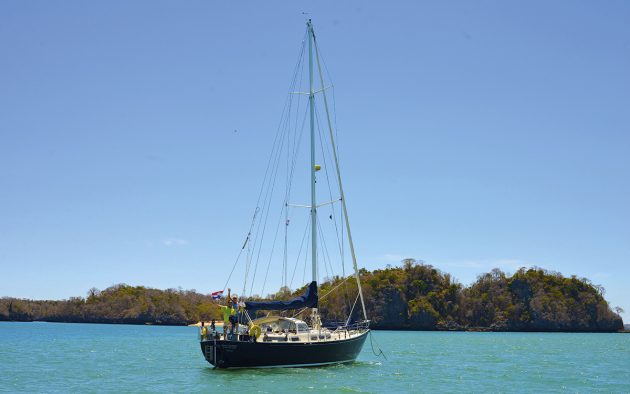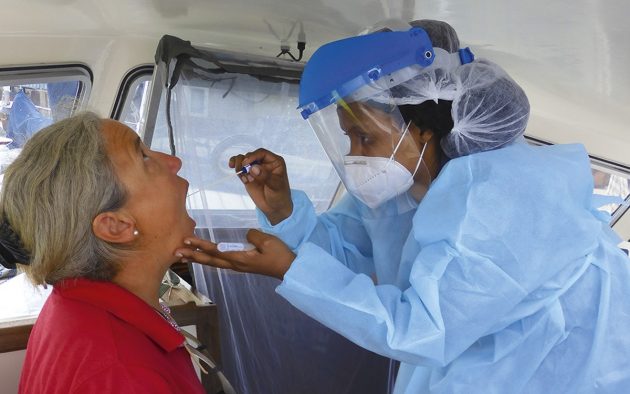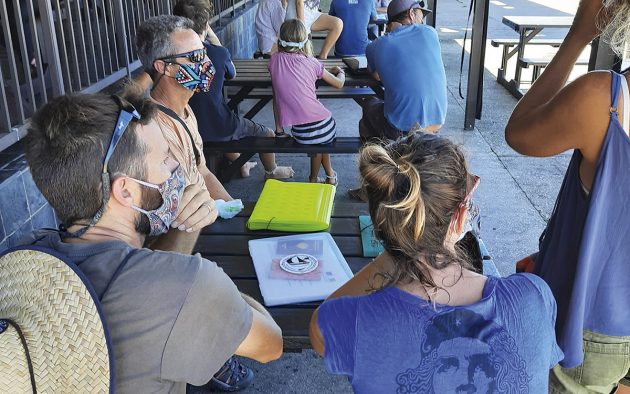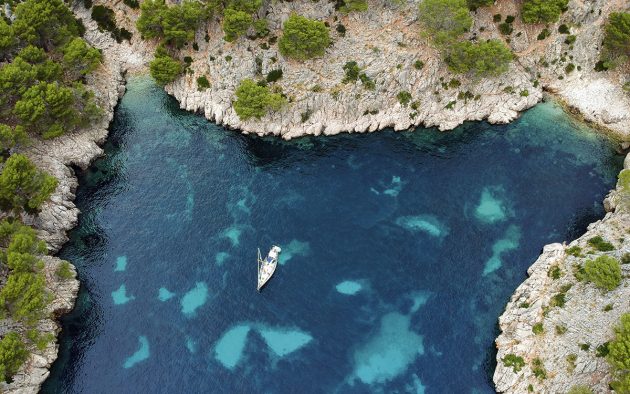Many bluewater cruisers had to adapt their plans for 2020; five share their tips on preparing to go sailing during Covid in 2021
With so much uncertainty still surrounding travel, should cruisers still be sailing during Covid? There is a moral quandary here. “We advise people to wait another year,” says Janneke Kuysters who, along with partner Weitze struggled being stuck in the South Pacific for parts of 2020.
“The countries that are popular with cruisers are usually the poorer countries that will be the last to receive vaccines. You’ll be heading to countries with weak and overburdened health care systems that are still a big infection risk. In 2022 a lot of that may be much more under control and will pose less risk.”
Some regions remain effectively out of bounds; most of the South Pacific is either closed to new arrivals, or full, or both. Even yachts which have managed to gain entry into Australia or New Zealand have been faced with breathtaking mandatory quarantine and marina charges.
You may be better modifying your country-hopping plans to reduce the risk if you plan on sailing during Covid. Elena Manighetti, spent 2020 crossing the Atlantic and cruising the southern Caribbean aboard her Tayana 37 Skua with her partner. “I’d take it easy in 2021 – the situation evolves daily and entry requirements change almost weekly. I’d choose a big country (or two) I like and spend most of my time sailing around there, never venturing too far from a harbour.”

If you do go, Janneke Kuysters says: “Leave a clean wake. We see that people get sick of the endless changes in demands and just go somewhere and sort it out on arrival. Usually it does get sorted out and people are let in. But if four, five or six boats show up unannounced, governments feel disrespected and start to make more and more demands on boats that are trying to do the right thing.
“Kindness and compassion are at the heart of the cruising community: we all need to work on keeping that going for cruising generations after us.”
Having to make a non-stop crossing of the Mozambique Channel was not the only impact Covid had on Janneke and Wietze’s around the world voyage, they also spent 11 weeks during the peak of the pandemic on anchor in the Maldives. We asked them, and other cruising couples, for advice on how to prepare for cruising in an ever-changing world:
Data
“The most useful thing we did was to buy a lot of data in Maldives,” recalls Janneke. “It was 40°C every day, with high humidity. We were not allowed on shore. Having lots of internet keeps your mind occupied: you can research possible options, devise plans A, B, C…”
They also used it for WhatsApp groups in anchorages, so cruisers could share information quickly.
Joshua Shankle, who spent three months on an uninhabited Pacific atoll mid-pandemic, agrees: “After Covid left us so isolated in 2020 we have a newfound respect for cell and satellite communication networks.
“We had a Garmin InReach on board that was helpful for communication and getting news updates while we were off the grid, and although we didn’t mind the limited plan with only texts and weather, other cruisers preferred more feature-rich Iridium satellite phones.

“Being able to check in with loved ones is a worthy expenditure. For 2021, we are increasing our plan to include unlimited tracking and texting.”
Power
Living full-time on board during periods of quarantine can put big demands on onboard power generation. Liveaboard sailors Phil Johnson and his partner were locked down at anchor in Antigua for over two months aboard their 47-footer Sonder.
“Nearly 600W of solar panels, combined with a 3,000W Victron inverter, and 900Ah of lithium batteries enabled us to keep working full-time throughout the lockdown at anchor. This was enough to power our laptops for eight hours-plus a day, make water, and catch up with friends and family on Zoom calls.
“This helped us to stay safely quarantined while still feeling connected – and keep our online business running. We used a local SIM card for internet data and topped up when venturing out to the grocery store.”
Shore contact
More paperwork is inevitable, and with regulations changing frequently being able to complete documentation at sea is important. Having a back-up shoreside contact could be invaluable.
“On our way to Sri Lanka, our agent (mandatory in Sri Lanka) started sending us all sorts of forms while we were at sea,” recalls Janneke Kuysters. “With limited satellite connections, this became a problem. No forms, no entry in the country. A cruising friend who was still in Malaysia received the same forms and filled them out for us.
“We took a picture of our signatures, added our boat stamp, decreased the file size and managed to send it over the satellite link to him. He pasted it into the forms and sent them off on our behalf.
“Since then we always have a shore contact who can handle unexpected forms for us. We make sure our shore contact has copies of our passports and the boat papers.”
 Cash
Cash
“Help comes at a price. If a country goes into lockdown, the rules are clear. You will not get in. But there is always an opportunity to buy fuel, food and water. Expect to pay a lot of money for that, cash in US dollars or Euros. So it pays to have a stash of money available, in small notes,” says Janneke.
Water
Thanks to high volume tanks many cruisers have not previously relied on having a watermaker – until 2020. Everyone we spoke to flagged this as an important upgrade or maintenance priority for future cruising.
Anna Caroline does not have a watermaker on board. “In all those years of cruising we never had an issue with water, so we decided against it,” explains Janneke.
“Being stuck in a very hot anchorage showed us that 10 litres per day for the two of us is doable, but we missed water for laundry. We bartered with other cruisers – teaching their children etc. for water or loads of laundry.”
Stocking up
Philippa Steventon is cruising the Med with her family on their Bowman 40 Bella. Like many cruisers she modified her provisioning plan: “We kept the boat stocked with more food than we otherwise would have done – just in case we would need to do a longer passage or stay out at anchor for a longer period of time.
“We also opted to do a few big stock-up shops rather than lots of smaller little trips to multiple shops.”
 “It pays to have lots of food on board, enough for a minimum of two weeks [quarantine] after your arrival date, even if you know that the country will take all your fresh products once you are cleared in,” Janneke adds.
“It pays to have lots of food on board, enough for a minimum of two weeks [quarantine] after your arrival date, even if you know that the country will take all your fresh products once you are cleared in,” Janneke adds.
Basic rations might suffice. “When things started getting bad in March, we stowed a 10lb bag of rice and a few other dry provisions on board, just in case,” recalls Phil Johnson on Sonder.
“It was enough to get by on for 14 days’ sailing if we were caught between borders in the Caribbean and had no choice but to sail straight back to the US.”
It’s not just food, buy fuel and water when you can, advises Janneke. “We have seen that the food supply to countries was disrupted; you compete with the locals for the available food. When you are quarantined in an anchorage, you will be the last to be able to buy something. Make sure you have enough to last longer than you think.
“The same applies to things which you usually think are available everywhere; a broken phone charger cable can become a big problem if you haven’t got a spare.”
Testing and Insurance
PCR testing on arrival and/or departure is likely to be a fact of life for some time, and needs budgeting for accordingly.

Health insurance may also become a condition of entry. “We expect that countries will demand proof of health insurance in case of Covid and/or insurance for repatriation. We’re seeing the first countries (Malaysia, Ascension Island) making those demands already. Make sure you have the necessary paperwork,” says Kuysters.
Staying informed
Facebook cruising groups and WhatsApp chat groups are often faster at updating on latest situation changes than official channels. “Know before you go. It can’t be overstated how helpful noonsite.com is for checking the latest border/quarantine rules as related to seafarers,” advises Phil Johnson.
Philippa Steventon recalls: “We monitored local and UK news online as obsessively as we did the weather. This meant that when we heard rumblings of Mallorca going back into stricter measures in the middle of the summer, we could take the chance to sail out before getting stuck.”
Antifouling
You may spend longer in the water, possibly stationary. “Go for the harder antifoulings,” says Janneke Kuysters. “Chances are that you’ll be sailing less miles than you think. Especially in tropical waters, the marine growth is very rapid.”
 Official help
Official help
“Make sure your embassy knows where you are and what you are doing. We found our foreign representation very useful,” advises Janneke Kuysters. But, she cautions, “They may expect you to hop on a repatriation flight, while you have no place to leave your boat behind.”
For British sailors in Europe, Brexit combined with the pandemic has created considerable bureaucratic headaches: “We are currently working with an agent here in Sicily, from Luise Yachting, who is doing a great job making sure that we stay on the right side of the authorities,” explains Philippa Steventon.
“Our planned trip back to the UK over Christmas became impossible due to the pandemic restrictions and cancelled flights. As such, on December 31 we were British Citizens in Europe and our Schengen clock began to tick.
“Due to the lockdown both here in Italy and the UK it is looking very likely that we will need to apply for an extension to our allotted 90 days – but that visa doesn’t yet exist as something you can just apply for. Our agent has been told four completely different versions of what we should be doing to satisfy the authorities.”
 If you enjoyed this….
If you enjoyed this….
Yachting World is the world’s leading magazine for bluewater cruisers and offshore sailors. Every month we have inspirational adventures and practical features to help you realise your sailing dreams.Build your knowledge with a subscription delivered to your door. See our latest offers and save at least 30% off the cover price.





 Cash
Cash Official help
Official help